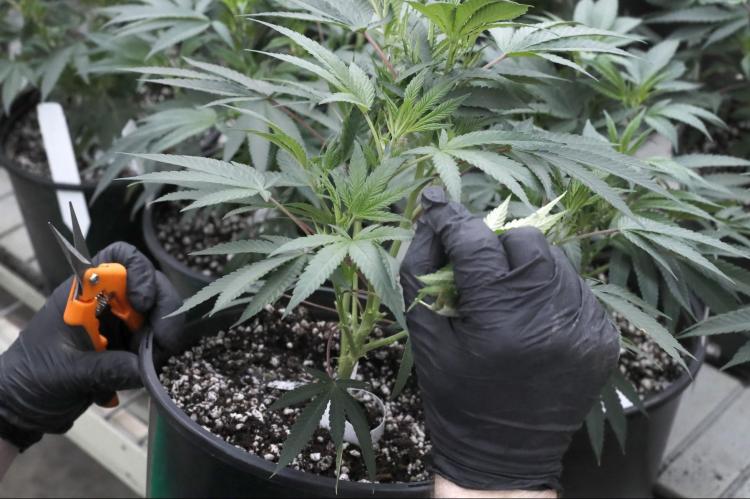The quarantine gardening boom extends to homegrown cannabis
When the film industry shut down productions in New York, cameraman Glenn Kaplan headed straight to his home in Vermont and got started with his new hobby. He had never had a garden before, but he now has vegetables and herbs growing in an outdoor raised bed, and four cannabis plants in a four-by-four foot tent in his house’s workroom.
“I’m obsessed,” Kaplan said. “Almost immediately I got back here and started ordering all the bits and pieces—which is kind of like setting up a little bit of a set: the grow tent, lights, the filter, exhaust fan. Everything is now auto-timed and has a Bluetooth reading of the humidity. As a kind of geek in the film world with technology, I’ve been putting that energy toward this.” Also, he estimated, about $800.
As some consumers turn to “victory gardens” to encourage self-sufficiency and combat the stress and supply chain disruptions brought about by Covid-19, companies such as Scotts Miracle-Gro and Lowe’s are reaping the benefits. Smaller businesses that support new gardeners with video classes and curbside pickup are flourishing too. For some, those gardens provide greens for more than just salad.
Kaplan said he uses cannabis four to five times per week, and as the coronavirus spread, he became concerned about his supply. “It’s not like I can go run and see a friend, because we’re social-distancing,” he said. (In Vermont, cannabis is legal to possess and grow in small quantities, but there are no recreational dispensaries and just a small handful serving the medical market.)
For the last few years Scotts Miracle-Gro, the maker of home, lawn, and garden-care goods, has attributed a growing portion of its sales to its subsidiary Hawthorne Gardening, which owns dozens of brands selling lights, filtration systems, premium soil, containers, air filters, and specialized supplies for hydroponic cannabis cultivation. In 2019, Hawthorne—which sells to both mega-cannabis growers and the retailers that supply home gardeners—accounted for over 20% of the company’s revenues, up from 5% in 2016.
Hawthorne’s $230 million in earnings for the quarter ended March 28 were up 60% from the same quarter a year ago. Miracle-Gro’s consumer division sales were up only 11% to $1.1 billion. The cannabis-focused business is a smaller piece of the pie, but growing much faster.
“We’re shipping more out the door at Hawthorne than we ever have before,” said Hawthorne head Chris Hagedorn on an earnings call May 6.
“We joked when all this started—not that it’s a joking matter, but you’ve got to find levity where you can … What were people going to do when quarantine hit the whole country? They’re going to sit at home and smoke pot and garden. And I think, in all seriousness, there’s a lot of truth in that statement.” Hagedorn added that an increased overall demand for cannabis amidst the Covid-19 pandemic has helped drive sales for supplies to grow the plant.
Marc Emmelmann, the founder of Green Carpet Growing, a San Diego, California–based cannabis cultivation consultancy, said he too has observed a post-coronavirus uptick in his business. Like many teachers, Emmelmann shifted his business’s focus online over the last few months, offering online classes and one-on-one video sessions at the rate of $75 per hour. Kaplan is among those clients, as is Eric Bernstein, a Toronto-based dog trainer, who estimates he’s spent about $1700 to get his new home-growing operation up and running.
Bernstein said the investment is already paying off.“I was spending $600 a month [on cannabis],” he said. “Now I’m not spending anything … it’s been the best marijuana I’ve ever smoked in my life. It’s so smooth.”
And the gardening itself has some agreeable side effects.
“I just thoroughly enjoy being around the plants,” said Bernstein. “It just does something to me that really relaxes me. I love it.”
- Log in to post comments

